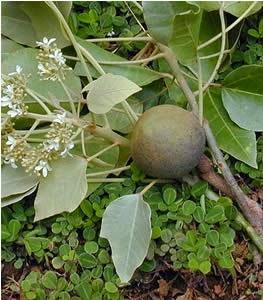 |
| Aleurites moluccans |
 |
| Kukui Nut |
This oil is known for leaving the skin soft and supple. By nature it is non greasy making application easy and mess free. It contains skin protecting vitamins such as A, C, and E who's antioxidant properties are known to help fight free radicles. Also containing essential fatty acids (EFA's) linoleic and linolenic acids. Essential fatty acids keep the skin looking youthful. Young skin is full of plump water filled cells. As we age our skin looses it's ability to retain water causing sagging, dull, and "crepe" skin. A healthy skin cell has a healthy membrane, keeping the good things such as water and nutrients in and allowing the cell waste to leave the cell. And low and behold essential fatty acids are what make for a healthy cell membrane, hence a healthy, vibrant skin cell.
 |
| Kukui Nut Oil |
 |
| Dried Kukui Nuts |
*Hair and Scalp treatments
*Babies Skin
*Reducing Dry Skin
*Reducing Dandruff
*Minor Burns, Cuts, Wounds
*Exposure to elements
*Radiation/Cheomo burns
This oil needs to be expeller pressed at cool temperatures to maintain the quality and health giving properties. As always make certain the the oils you choose come from reputable sources.
We would love to hear about your experience with Kukui Nut Oil! Please like, comment, and share to insure that we are able to keep presenting you with quality information.
Thank you and until next time,
Recherche Organics







